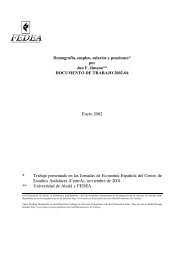The Evolution of Retirement by J. Ignacio Conde-Ruiz* Vincenzo ...
The Evolution of Retirement by J. Ignacio Conde-Ruiz* Vincenzo ...
The Evolution of Retirement by J. Ignacio Conde-Ruiz* Vincenzo ...
Create successful ePaper yourself
Turn your PDF publications into a flip-book with our unique Google optimized e-Paper software.
we emphaze the relevance <strong>of</strong> the incentives to retire early — i.e., the substitution<br />
effect — in line with a large empirical literature which shows how (at the margin)<br />
non-actuarially fair pension systems may induce rational agents to retire<br />
early, <strong>by</strong> reducing the opportunity cost <strong>of</strong> leisure. In this scenario, we obtain<br />
a political equilibrium characterized <strong>by</strong> a raising sequence <strong>of</strong> social security tax<br />
rates converging to a steady state. Along this equilibrium path, the use <strong>of</strong> early<br />
retirement provisions is increasing. <strong>The</strong> results <strong>of</strong> the comparative statics on<br />
this specification are dismaying. In line with the conventional wisdom in the<br />
economic literature, but unlike most <strong>of</strong> the implications found in the political<br />
economy literature (see Galasso and Pr<strong>of</strong>eta, 2002), productivity slow-downs<br />
(and aging) are expected to lead to higher social security contributions and to<br />
more early retirement.<br />
In the latter economic specification, we introduce a negative effect <strong>of</strong> income<br />
on the retirement decisions: a decrease in the labor income when adult leads to<br />
postpone retirement. In this scenario, which aims at including an additional long<br />
term determinant <strong>of</strong> the retirement decision — namely the life-time income — the<br />
political economic equilibrium is still characterized <strong>by</strong> an increasing sequence<br />
<strong>of</strong> social security tax rates and early retirement converging to a steady state.<br />
Yet, comparative statics now suggest that a decrease in the adult labor income<br />
will reduce the use <strong>of</strong> early retirement provisions, even after the effects on the<br />
equilibrium social security contributions are considered. To the extent that this<br />
change in adult income may proxy for a change in the net life-time income,<br />
we believe that this may prove an important result for the evolution <strong>of</strong> the<br />
early retirement provisions. In fact, we notice that, <strong>by</strong> reducing the internal<br />
rate <strong>of</strong> return to social security, aging also decreases the life-time net income <strong>of</strong><br />
the new generations — the more so, the more the system is used. In its initial<br />
specification — with no income effects — our politico-economic model suggests<br />
that aging leads to a large social security system and to more early retirement.<br />
21






